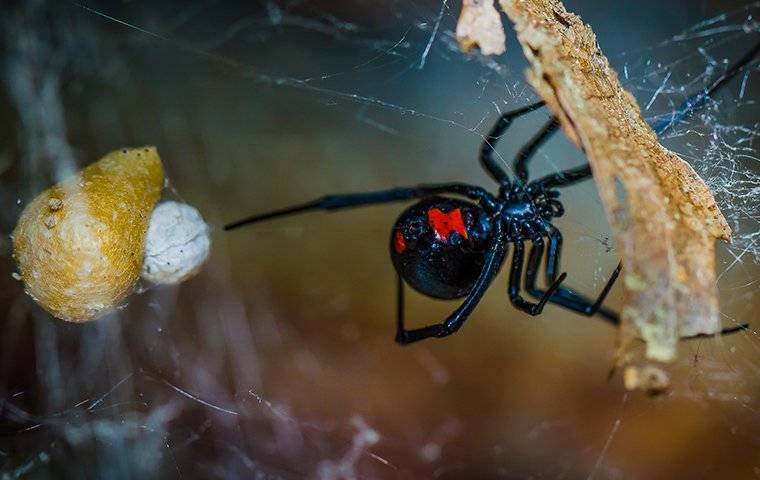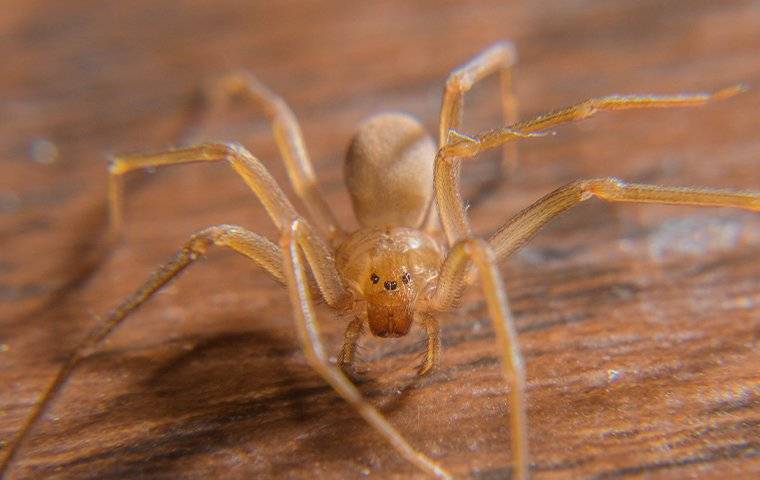
What To Do About Spider Infestations Inside Your Greensboro Home
Are you concerned about spiders and spider bites? If so, we have some good news for you. Most of the spiders you'll find in your Greensboro home are harmless spiders, and certain spiders that can cause a wound that feels like a pinprick or a bee sting don't prefer to bite you. If you take precautions, you can significantly reduce the risk of an uncomfortable spider bite wound. The unfortunate reality of a spider infestation in your home is that it can grow. The more spiders you have in your home, the greater the chances of an unwanted encounter, such as putting on a shirt with a spider clinging to it. When this happens, you'll likely get bitten—assuming the spider on your shirt has the ability to bite you. Today, we're going to give you some insights into which Greensboro spiders can bite and which spiders don't. We'll look at the two types of spiders that are considered a medical threat and hopefully ease some of your concerns about these two spiders. We'll end by discussing the safe approach to dealing with spiders in Greensboro. We understand that some of you have zero tolerance for spiders and may use products that are actually more harmful than the spiders themselves. We hope to steer you away from doing that by giving you information that will help you reduce your fear of spiders.
If you would like to speak with a professional about the spiders you're finding in your Greensboro home or you need information on the identification of common house spiders, connect with us. Go-Forth Home Services offers advanced and environmentally friendly pest control in Greensboro. We use science to solve pest problems with the least amount of control materials. We'll help you find the best solution.

The Types Of Spiders That Live In Greensboro
There are two types of spiders that are very common in our area. It is likely you've seen them. One is the long-bodied cellar spider, also referred to as the daddy longlegs. You'll find these long-legged spiders in your garage or boiler room. While creepy and annoying, these spiders are entirely harmless. They don't have the ability to bite you because their fangs are too weak. The other common spider is the American house spider. It is a tiny arachnid with a bulbous abdomen. These spiders create light webbing and tend to have multiple webs at one time. While able to bite humans, they rarely do. If you wake up with a red, itchy welt on your skin, it is possible that one of these spiders left that wound, but it isn't likely.
There are several spiders that can bite you and cause a wound with localized pain. Orb weavers, funnel weavers, wolf spiders, and more. The good news is that most of these spiders prefer to live outdoors. They won't stay long inside. If you find one in your home, you may put it back outside and seal your exterior to prevent continued entry.
Along with these spiders, there are several tiny spiders that find their way inside. None of these tiny spiders will do more than cause a small, itchy wound. There are far too many common spiders in Greensboro to walk through a description of each. Fortunately, it isn't necessary. Let's look at why.
Is It Dangerous To Have Spiders In My Home?

As you can see, spiders are mostly nuisance pests that don't generally bite. While it is nice to get rid of spiders for convenience, in most cases, there is no medical concern. But we do have two spiders that are dangerous to have in your home. It is essential to know how to identify them.
Black Widow Spiders: These are small, black, shiny spiders. On the bottom of the abdomen, a black widow has a red hourglass marking. If you see a small, black spider that doesn't have any visible hairs on its body, it is a good idea to get that spider identified by a professional. If able, take a picture with your phone and send it to us. Black widows have venom that is potentially dangerous to humans. While black widow spider bites in the United States are not life-threatening, they can send you to the hospital with serious flu-like symptoms or worse.
Brown Recluse Spiders: These are small, brown, hairless spiders. On the back of a brown recluse spider is a dark brown violin marking. Keep in mind that this marking is tiny because these spiders are tiny. If you see a recluse spider in your home, you should know that its venom can cause necrosis. Seek medical attention to monitor any bite inflicted by a recluse to prevent the spreading of necrosis.
Now that we've looked at the bad news, let's consider the good news. Black widow spiders don't prefer to live indoors and may only stay in your home for a short period before going back outdoors. Brown recluse spiders do very well indoors and can grow a large population, but they rarely bite people. They are reclusive by nature and steer clear of people if at all possible. So, while it is definitely a good idea to address dangerous spiders in your home, you don't need to fear these spiders in your house. Take precautions as you seek to resolve your infestation with professional assistance, and you should have little to worry about with black widows or brown recluses.
What Attracts Spiders To Come Inside Homes?
There are only a few conditions that increase the likelihood that spiders will enter your Greensboro home. If you understand these conditions, you can do something about them. Here are our best tips for all-natural spider management.
- Manage your trash to reduce the scent of garbage. While spiders don't eat the food in your trash, they eat the flies and other insects that are drawn to your trash. Get your trash receptacles to the curb weekly, refrain from overfilling your trash, and clean your receptacle if it gets stinky. Doing these things will go a long way toward deterring spider activity.
- Manage exterior light sources. Insects are attracted to light. If you have exterior lights that stay on all night, you will have an ongoing attractant for insects. As the insect population rises, so will the spider population. We recommend installing motion-sensitive lights or fixtures. If you need light to stay on in a certain zone, replace white lights with yellow lights. Insects can't detect light in the yellow spectrum.
- Remove objects that spiders hide under or inside. A spider can climb into any object that has a void. They'll also hide in wood piles, dead branches, stacked stones, and other organic materials. Move objects away from your exterior to reduce spider activity.
- Remove spider webs. A single web can contain hundreds of spiders. How? Some spiders create egg sacs in their webs. These sacs can have 300 spider eggs inside. That's a ton of spiders waiting to hatch. Remove the webs and the egg sacs and you'll prevent those spiders from hatching near or inside your home.
- Seal entry points. Spiders don't tunnel into your home. They use openings that already exist. When you fill those openings with expanding foam or a caulking material, spiders won't have the ability to get inside.
- Keep your home free of food debris. When insects get inside and find food, they can reproduce. When spiders come inside and find insects, the same will happen. These pests will all stay in your home if there is food.
- Keep your kitchen trash covered, and make sure to put the trash out frequently. Most homes have no trouble producing enough trash for routine trash removal daily or every other day, which is more than enough to deter insects from breeding in the trash. Trouble starts when trash sits longer or when food items are put in wastepaper baskets.
It is hard work to manage insects and spiders, and some residents turn to pest control products to address spider problems. We don't recommend doing this. Not only can these products impact your health, but they do not work well to arrest spider infestations. Most products only deal with the symptom of the problem, which are the spiders crawling around in your home. You need to address the source of the problem, which is food, water, hiding places, egg sacs, and entry points. You can do this yourself, or get some help.
The Safest Way To Get Rid Of Spiders In Your Home
It is best to have a professional address spider problems, particularly a company that uses Integrated Pest Management, which puts an emphasis on using natural solutions first. Your Go-Forth Home Services technician will perform an inspection, identify entry points and areas of infestation, apply control methods to arrest activity, monitor spider activity, and use exclusion materials to keep spiders from continuing to enter. Once your infestation is addressed, exterior treatments can reduce spiders and spider food, deter entry, and keep your home spider-free.
If you'd like to learn more or schedule a service visit, connect with us. When you have spider questions, we have spider answers.
Customer Reviews
-
“He spent time educating us about "pests" and provided information regarding services with GoForth.”- Joyce C.
-
“Texted me before coming. Worked with me playing musical rooms with my dogs. I'll see how things are.”- Constance E.
-
“Amazing response time, reasonable prices, great customer service. Tevin was thorough and confident in his plan to fix our horrendous fire ant problem. We have had negative experiences with prior exterminators and probably waited way too long to call Go-For”- Ashley T.
-
“- Toya B.
We have been customers for almost 7 years for a reason. Our technician is the best. He always knows exactly how to address whatever pest has decided to bother us. We have referred them to many of our neighbors. Well worth the cost not to have to worry a
” -
“Answered all my questions and I felt their pricing was very reasonable.”- Deborah J.
-
“Brian went above and beyond what was expected, and I hope I get him again as my technician for future services!”- Tam L.
-
“He was thorough with inspecting and treating our home, which I really appreciate, and he took the time to answer my many questions.”- Jasmine B.
-
“Love the detailed summary and pics of what he did and saw! And did I mention how wonderful Olivia was to get us all set up?!!”- Beechy A.


Over the years, we’ve boiled down our mission to a core set of values:
-
Give A CrapDelight others by owning your role and saying yes. Take pride in how you appear & act & every other detail of the job. Be on time, attentive, & enthusiastic. Act as if the buck stops with you on every aspect of the job.
-
Chase PerfectionChase Perfection, knowing full well we will not reach it, but along the way we will catch excellence. Have a sense of urgency; Go-Forth Time - right now might be the only time you have to get it right.
-
Dig Deeper
Be an action-oriented professional that makes decisions based on evidence rather than stories & assumptions. Stay curious. Data can speak for itself.
Understand the cause of the fire rather than rushing to extinguish it.
-
Fight For SimplicityKeep it simple & consistent. Focus on how things should be done every time.
-
Face It, Fix ItConfront challenges directly and address issues head-on. A bias for action and powerful conversations drive our progress. It’s about getting it right rather than being right.
-
Grow!Growth is our purpose. Growing as people & growing our business.